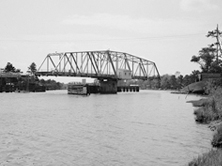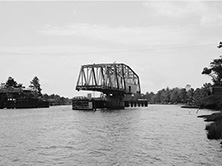 The no longer extant Core Creek Bridge (1935), N.C. 101 over the Intracoastal Waterway, Core Creek, Carteret County. The center-bearing swing span bridge is in the process of turning on a central pivot (Source: Library of Congress, Prints & Photographs Division, HAER, Reproduction number HAER NC-47-8).
The no longer extant Core Creek Bridge (1935), N.C. 101 over the Intracoastal Waterway, Core Creek, Carteret County. The center-bearing swing span bridge is in the process of turning on a central pivot (Source: Library of Congress, Prints & Photographs Division, HAER, Reproduction number HAER NC-47-8). A swing span bridge rotates in a horizontal plane around a vertical axis into a position parallel with the marine channel and shore, allowing boats and ships to pass along a waterway that would otherwise be obstructed by the bridge.
The movable span is supported by one of two methods: center-bearing on a vertical pin or pivot, or rim-bearing on a circular girder called a drum that moves on rollers.
The most common swing span design is the lighter and more easily operated and maintained center-bearing design known as the pivot pier. The rim-bearing design is less common and used for wider and heavier bridges.
The superstructure can be trusses, stringers or girder-and-floorbeam. The choice of superstructure almost always reflects the prevailing practices of fixed bridge construction, with the specific type and design matched to the length and capacity needed at the crossing.
 The Core Creek Bridge in the fully open position.
The Core Creek Bridge in the fully open position. Swing bridges are rotated by a series of gear sets and a rack-and-pinion drive. Operator’s houses and equipment houses with the controls and machinery are located adjacent to or on the bridge, depending on its size. North Carolina's examples are electrically operated, although they often have gasoline or diesel motor or even hand-cranked backup systems.
All of North Carolina's surviving swing bridges are later examples of the well-established technology. The state's oldest complete swing span is the bridge carrying U.S. 17 Business over the Perquimans River at Hertford (Perquimans County Bridge 8), built in 1929. However, the bridge is weakening and is scheduled to be replaced by a new swing bridge in 2021.